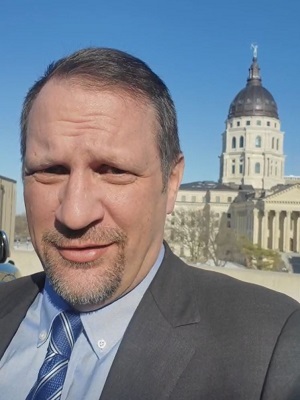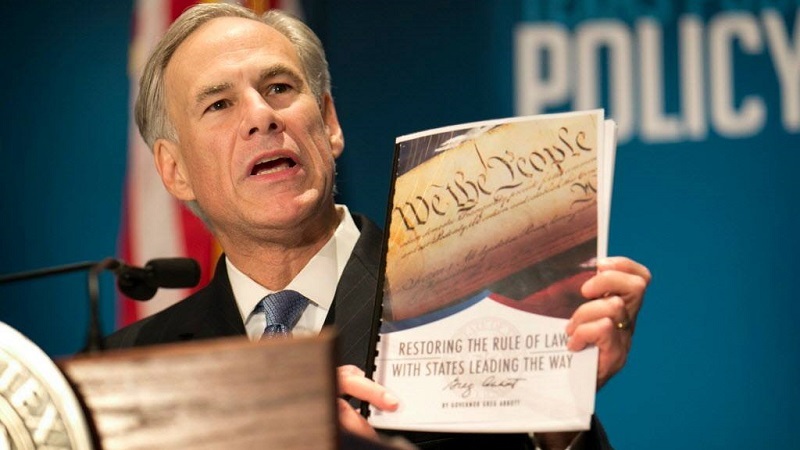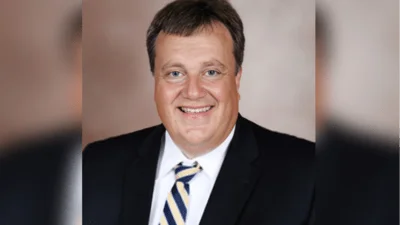Texas Gov. Greg Abbott announced The Texas Plan in 2016. | facebook.com/SD-District-7-Convention-Of-States
Texas Gov. Greg Abbott announced The Texas Plan in 2016. | facebook.com/SD-District-7-Convention-Of-States
Last month's defeat in South Dakota of the Convention of States Resolution isn't the last the state will hear of the effort to amend the U.S. Constitution, a regional director for the movement told Rushmore State News.
South Dakota grassroots supporters of the movement for an Article V Convention are down, not out, and they remain "determined," David Schneider, Convention of States regional director, said. "They are now focused on recruiting for the upcoming primaries," he said.
Schneider pointed at Lee Schoenbeck (R-Watertown), South Dakota Senate president pro tem, for the state legislative leadership's opposition to the resolution.

David Schneider, Convention of States regional director, at the Kansas state Legislature earlier this month
| facebook.com/schneider.david.p/
"Lee Schoenbeck thinks it is a stupid idea," Schneider said. "He was on record as saying we have rocks in our heads."
Schneider has been part of the Convention of States since October 2013. His region includes South Dakota and Kansas, according to his LinkedIn page. In 2019, Schneider testified in favor of the resolution before the Kansas House Committee on Federal and State Affairs.
Shortly after the resolution's defeat in South Dakota, Mark Meckler, Convention of States Action president, blamed Sen. David Johnson (R-Rapid City) for the resolution's defeat, according to the group's website. Referring to a "sickening display of cowardice," Meckler said both Republican senators, Schoenbeck and Johnson, blocked the resolution. Meckler said, "They killed the resolution — refusing to even debate the issue."
Schneider said there was plenty of support visible while the resolution, called House Joint Resolution 5001 (HJR 5001), was still in a Senate committee, where he was present during a critical point for the resolution. Action in committee followed 39-30 passage of the resolution in the state House in late January, according to the South Dakota Legislature's website.
"The [Senate committee] room was packed with COS supporters from all over South Dakota, along with former U.S. Senator Rick Santorum giving supportive testimony," Schneider said, adding that even then Schoenbeck was against passage. "A motion to pass the resolution was substituted for a motion to kill the resolution by Senate [President] Pro Tem Lee Schoenbeck, which signals he wanted his lieutenants to kill the issue, and the ensuing vote reflected that."
Schoenbeck's "motion to kill" did not succeed, Schneider said. "Since there is overwhelming grassroots support, a 'smoke out' was voted on to forcefully pull the resolution out of committee," he said. "That was successful, but the ensuing calendaring motion failed by two votes, thus stopping the effort."
HJR 5001 failed 16-19 in the Senate in early February.
The Convention of States Resolution calls for a Constitutional Convention of all states in the nation to limit the federal government's power and jurisdiction and to impose upon it legal and fiscal restraints. The resolution also includes provisions to impose term limits on federal officials. The resolution calls for an amending convention, because a constitutional convention seeks to completely rewrite the framework of government and deliver a new constitution, whereas an amending convention only offers particular amendments to the existing constitution. Those amendments, in turn, must be ratified by 38 states before being added to the Constitution.
Georgia, Alaska and Florida were the first states to pass the resolution, doing so in March and April of 2014, according to the Convention of States website.
One of the most dramatic moments in the resolution's history came in 2016, when Texas Gov. Greg Abbott announced The Texas Plan, calling for an Article V Convention of States "to restore our Constitution." The Texas Legislature passed the resolution the following year.
The Convention of States Resolution has been passed in 18 states, just over half of the necessary 34 to call a convention. Wisconsin and Nebraska are among the two most recent states to act. Both passed the resolution early this year, according to the Convention of States website.
Last week, West Virginia became the 18th state to pass the resolution. It passed in that state's House and Senate in one day. This week, the Kansas state House narrowly failed to reach the required two-thirds majority to advance the resolution.
The resolution has advanced in one legislative chamber in Iowa, New Hampshire, New Mexico, North Carolina, South Carolina, South Dakota and Virginia. The resolution is under active consideration in Hawaii, Illinois, Iowa, Kansas, Kentucky, Maryland, Massachusetts, Michigan, Minnesota, New Hampshire, New Jersey, New Mexico, New York, North Carolina, Ohio, Pennsylvania, South Carolina, South Dakota, Vermont, Virginia, Washington and Wyoming.




 Alerts Sign-up
Alerts Sign-up